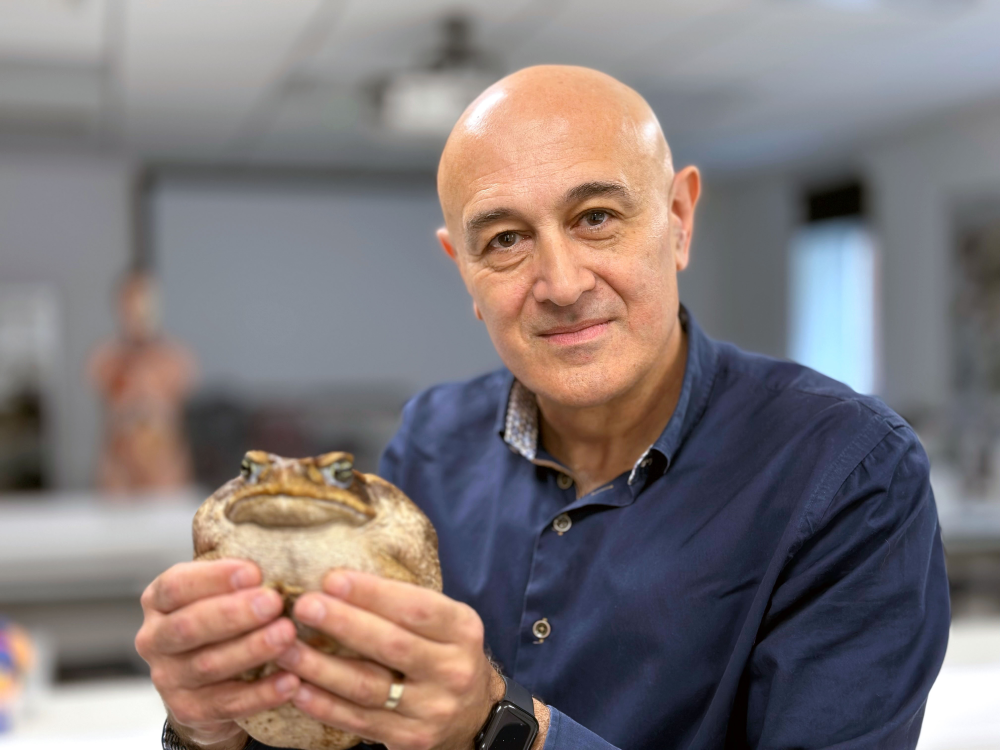The human brain is a hefty thing. Weighing well over a kilo, its an electrified lump that’s been compared by neuroscientists to the texture of silken tofu, and yet within its innumerous connections is coded everything that we are.
That wasn’t always the case, however. In fact, among the earliest lifeforms, eyes actually evolved before the brain. It makes you wonder: How exactly did we get to the human brain? And why are we so much more cognitively advanced than other mammals?
I wanted to find out, and with his latest series Secrets of the Brain set to air on BBC Two on September 29, Professor Jim Al-Khalili was an obvious person to ask. His mission? To dive into the history of the brain, and the pivotal changes that led to humans and our close relatives becoming so advanced at things like problem-solving and socializing.
Survival of the brainiest
The search for those answers led to Prof Al-Khalili, highly respected science communicator that he is, hanging from a tree in a less-than-comfy harness for several hours. It might not have been the most relaxing way to demonstrate how hard the primate brain had to work to be able to forage in the treetops while keeping an eye out for predators, but it’s a good reminder of what a lot of our intelligence is attributable to: struggle.
“Like a lot of people, I assumed the human brain evolved because we’re smart and it’s doing all this data processing and analysing because we develop language, and because we have opposable thumbs,” Al-Khalili told IFLScience. “What I hadn’t appreciated was that this evolution, it’s a story that is continuous.”
Our ancestors had to cope with challenges, to survive, to find food, and that required more brain power.
Professor Jim Al-Khalili
“It wasn’t that animals were stupid and then humans turned up and became very smart. There were all these steps along the way, and a lot of them are just completely fortuitous.”
“You have mass extinctions, and then the organisms, the creatures, the animals that are left behind, they have to cope. Our ancestors had to cope with challenges, to survive, to find food, and that required more brain power.”
“So, the brain is growing because these creatures need to be able to adapt to their environments, and because this is evolution, those that brains don’t grow, don’t survive. It’s only the smart ones that survived, but they developed their smartness because they needed to, it wasn’t that they survived because they were already smart.”

Secrets Of The Brain isn’t just about humans, and we meet all kinds of curious creatures along the way.
Image credit: BBC/Furnace Ltd/Andy Jackson
The social brain theory
Another key contributor to human intelligence is our sociality. Even early primates have to exist within complex social systems, and we see within apes like bonobos and chimps how a failure to fit in can be a matter of life and death. If ape society is complex, then humans took it to a whole new level, which is what’s inspired a theory known as “the social brain theory”.
“It’s quite a complex idea that primates developed large brains because they needed to manage complex social systems, and I think for humans, even more so than any of the other primates, that’s what makes us uniquely human,” said Al-Khalili. “We live within these collective structures and societies that are very complicated, and the more complex our societies and social structures become, the harder the brain has to work, and the smarter we get.”
Say hello to the neocortex
Understanding the motivations is one thing, but what about when we look at that pink lump itself? What is it about the mammalian brain that changed along the tree of life until we wound up with this complex, highly social, and problem-solving primate brain? It all started out with a bump known as the neocortex.
Where you first start to see that bump by modelling fossilised skulls, you see that it grew to serve a particular purpose.
Professor Jim Al-Khalili
“It initially grew in the early plesiadapiformes, and even creatures like Morganucodon – a kind of proto mammal that lived 200 million years ago,” said Al-Khalili. “Where you first start to see that bump by modelling fossilised skulls, you see that it grew to serve a particular purpose. They had a strong sense of smell because they needed to forage for food at night, and because they were becoming warm-blooded they needed to be on the lookout for predators and look out for food.”
“[They had] those needs to survive, and the fact that they then cause this bump that becomes the neocortex, and then gradually it does everything. It does all our high level thinking, our memory, our motor actions, but one thing I didn’t realise was that only mammals have a neocortex.”
“So, it’s not the way that other creatures, like birds, think. Or invertebrates like octopuses, they’re intelligent, but their evolutionary path has taken a different direction in achieving that intelligence.”
Want to know more about that clever lump in your skull? Catch Secrets Of The Brain on BBC Two on Monday, September 29.
Source Link: Why Are Humans So Smart? It All Began With A Bump